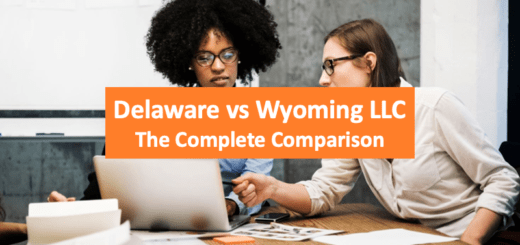The Complete Guide to Starting an Ohio LLC
Table of Contents

Are you a sole proprietor or small business owner evaluating which state is best to form your LLC? Look no further than Ohio. In this complete guide to forming an Ohio LLC, we’ll cover everything you need to know about starting an LLC in the Buckeye State. From the benefits of forming an LLC in Ohio to step-by-step instructions on how to get started, we’ve got you covered.
What is an LLC?
A Limited Liability Company, or LLC, is a type of business structure that combines the liability protection of a corporation with the tax benefits of a partnership. LLCs are popular among small business owners because they offer flexible management structures and pass-through taxation.
What is an Ohio Single-Member LLC?
An Ohio single-member LLC is a type of LLC with only one owner. This type of LLC is popular among small business owners who want to protect their personal assets and have flexibility in managing their business.
What is an Ohio Multi-Member LLC?
An Ohio multi-member LLC is a type of LLC with two or more owners. This type of LLC is popular among businesses with multiple owners who want to limit their personal liability and have flexibility in managing their business.
Why is Ohio a Good State to Form an LLC?
Ohio is a great state to form an LLC for many reasons. For starters, the state has a strong economy with a diverse range of industries, making it an attractive location for businesses. Additionally, Ohio offers a favorable tax climate for LLCs, with no state-level taxes on LLC income and a relatively low corporate tax rate. Ohio also has a supportive business environment, with resources and programs available to help small business owners start and grow their businesses. These factors make Ohio a great state to form an LLC and grow your business.
Ohio LLC Benefits
When you form an LLC in Ohio, you can enjoy a range of benefits. These benefits include limited liability protection for owners, pass-through taxation, flexible management structures, fewer formalities and regulatory requirements than corporations, and the ability to raise capital through the sale of ownership interests. Additionally, Ohio has no state-level taxes on LLC income, a low corporate tax rate of 0.26%-1.23%, and access to a large and diverse pool of skilled workers.
No State-Level Taxes on LLC Income
Ohio is one of the few states that does not impose state-level taxes on LLC income. This means that LLCs operating in Ohio only have to pay federal taxes on their income. This tax policy can be a significant advantage for LLCs in Ohio, as it can help reduce their tax burden and increase profitability.
Low Corporate Tax Rate
Ohio has a relatively low corporate tax rate of 0.26%-1.23%, making it an attractive state for businesses looking to minimize their tax burden. This low tax rate can provide businesses with significant tax savings, which can be reinvested back into the company to fuel growth and expansion.
Ohio Business Gateway
The Ohio Business Gateway is a state-run website that provides resources and support for small businesses, including access to government services and resources for starting and growing a business. The Ohio Business Gateway can help businesses navigate the complexities of starting and running a business in Ohio, making it easier for entrepreneurs to focus on growing their businesses.
Limited Liability Protection
LLCs in Ohio offer limited liability protection to owners, shielding their personal assets from business-related debts and obligations. This means that if the LLC faces lawsuits or incurs liabilities, the owners’ personal assets are not at risk. This protection gives business owners peace of mind and allows them to focus on growing their business.
Pass-Through Taxation
LLCs in Ohio benefit from pass-through taxation, meaning that the business itself does not pay taxes. Instead, the income and expenses of the LLC are passed through to the owners’ personal tax returns. This results in potential tax savings for business owners and simplifies the tax filing process.
Flexible Management Structure
Ohio LLCs offer flexibility in the management structure, allowing owners to choose between a member-managed or manager-managed structure. This flexibility enables business owners to customize their management approach to fit their business needs and goals.
Fewer Formalities and Regulatory Requirements
LLCs in Ohio have fewer formalities and regulatory requirements than corporations, making them easier to run and manage. This can save business owners both time and money, allowing them to focus on what matters most – growing their business.
Favorable Tax Climate
Ohio has a favorable tax climate for businesses, with no state-level taxes on LLC income and a relatively low corporate tax rate. This means that businesses in Ohio can enjoy tax savings, which can help to increase profitability and growth. The state’s tax-friendly policies have made it a popular destination for businesses looking to establish themselves in a favorable business climate.
Ability to Raise Capital
LLCs in Ohio can raise capital through the sale of ownership interests. This provides businesses with a means of securing financing without taking on debt or sacrificing control over the business. The ability to raise capital can be especially beneficial for businesses looking to expand or invest in new ventures. By selling ownership interests, an LLC can raise capital and take advantage of new opportunities while maintaining control over their business.
Ohio Incumbent Workforce Training Voucher Program
Ohio offers a workforce training program that provides financial assistance to businesses for employee training and development. This program can help businesses improve their workforce skills and competitiveness. By helping businesses invest in their employee’s skills, the program can increase productivity and efficiency, leading to increased profitability and growth.
Ohio Third Frontier Program
The Ohio Third Frontier Program is a state-funded initiative that provides funding and support for technology-based startups and small businesses. This program can help businesses access capital and resources to grow their businesses. The program offers a range of services, including funding for research and development, access to mentorship and networking opportunities, and support for commercializing new products and technologies. These resources can be invaluable for startups and small businesses looking to innovate and grow their businesses.
Supportive Business Environment
Ohio offers a supportive business environment with a range of resources and programs designed to help small business owners start and grow their businesses. The Small Business Development Center and the Ohio Small Business Development Centers Network provide business owners with access to valuable services, such as counseling, training, and assistance with securing financing. These resources can help to increase the chances of business success and growth.
Innovative Business Climate
Ohio has a strong reputation for innovation and entrepreneurship, with a growing startup ecosystem and a range of resources available to help entrepreneurs start and grow their businesses. Ohio’s business-friendly policies and supportive business environment have helped to foster a culture of innovation and entrepreneurship, making it an attractive destination for startups and entrepreneurs alike. The state’s focus on innovation has led to the creation of new industries and jobs, driving economic growth and prosperity in the state.
Forming an Ohio LLC can provide a range of benefits for small business owners, including protection of personal assets, favorable tax treatment, flexible management structures, fewer regulatory requirements, access to a skilled workforce, and the ability to raise capital. Additionally, Ohio has a supportive business environment with resources and programs available to help entrepreneurs start and grow their businesses. These factors make Ohio a great state to consider when forming an LLC.
Ohio LLC Cost
Starting an LLC in Ohio involves several costs, both initial and ongoing. To give you an idea of what to expect, here are two charts outlining the costs associated with forming and maintaining an Ohio LLC:
One-Time Costs
| Cost | Description | Fee |
|---|---|---|
| Articles of Organization | Filing fee to create LLC with Ohio Secretary of State | $99 |
| Name Reservation | Optional reservation of LLC name prior to filing Articles of Organization | $39 |
| Professional Services | Costs for legal or financial professional services such as attorney or accountant | Varies |
| Operating Agreement | Document outlining ownership and operating procedures of LLC (optional but recommended) | $0-$500 |
| Initial Business License and/or Permits | Varies by city/county and industry | Varies |
| Total | $138-$639+ |
Ongoing Costs
| Cost | Description | Fee |
|---|---|---|
| Annual Report | Report to update Ohio Secretary of State with LLC’s current contact and ownership information | $0-$200 |
| State Taxes and Fees | Annual fee for doing business in Ohio | $0-$200 |
| Statutory Agent | Fee for designated individual or company to receive legal documents on behalf of LLC | $0-$200/year |
| Renewal Business License and/or Permits | Varies by city/county and industry | Varies |
| Total | $0-$600+ |
As you can see, the costs of forming and maintaining an Ohio LLC can vary depending on several factors, including location and the services you choose to use. However, forming an LLC in Ohio can be a cost-effective way to protect your personal assets and grow your business.
How are Single-Member LLCs Taxed in Ohio?
Single-member LLCs in Ohio are treated as disregarded entities for tax purposes. This means that the LLC itself is not taxed, but instead, the owner reports the business’s income and expenses on their personal income tax return. This pass-through taxation structure can result in potential tax savings for the owner.
How are Multi-Member LLCs Taxed in Ohio?
Multi-member LLCs in Ohio are treated as partnerships for tax purposes. Like single-member LLCs, the LLC itself is not taxed, but instead, the owners report their share of the profits and losses on their personal income tax returns. This pass-through taxation structure can result in potential tax savings for the owners.
How to Start an Ohio LLC
Now that you understand the benefits of forming an LLC in Ohio, let’s dive into the step-by-step process of how to get started.
Step 1: Pick a Name for Your LLC
To form an LLC in Ohio, you must first choose a unique and distinguishable name for your business. You can check the availability of your desired name on the Ohio Secretary of State’s website and reserve it for up to 180 days by filing a Name Reservation form.
Step 2: Choose an Ohio Registered Agent
Designate a person or entity to receive legal documents on behalf of your LLC. Your registered agent must have a physical address in Ohio and be available during business hours. You can choose to act as your own registered agent, but it’s often beneficial to hire a professional registered agent service for added convenience and privacy.
Step 3: Get an Ohio Business License
Determine if your business requires a license by checking with the local government and the Ohio Secretary of State’s website. Obtain necessary licenses or permits for your business to ensure compliance with Ohio law.
Step 4: File a Certificate of Formation
File a Certificate of Formation with the Ohio Secretary of State to officially form your Ohio LLC. Include basic information about your LLC, such as its name, registered agent, and business address, and pay a $99 filing fee.
Step 5: Get an EIN
Obtain an Employer Identification Number (EIN) from the IRS to identify your business for tax purposes. You can apply for an EIN online through the IRS website. An EIN is necessary to open a business bank account, hire employees, and file taxes.
Step 6: Create an Operating Agreement
Create a legal document that outlines the ownership and management structure of your Ohio LLC. This Operating Agreement should include important topics such as ownership and membership structure, management structure, profit and loss distribution, decision-making process, and dissolution. It is recommended that you consult with an attorney or legal professional when drafting your Operating Agreement to ensure compliance with Ohio law and accuracy in reflecting the needs and goals of your business.
How to Choose a Registered Agent
When choosing a registered agent for your Ohio LLC, consider factors such as their availability during business hours, their ability to receive and forward legal documents promptly, and their level of experience in handling legal matters. You can choose an individual or a professional registered agent service, but it’s important to ensure that they meet the state’s requirements for registered agents.
What Needs to be Included in an Ohio State Articles of Organization
The Articles of Organization for your Ohio LLC should include basic information such as the LLC’s name, the name and address of the registered agent, and the name and address of the LLC’s organizers. You can include additional provisions, such as management structure and ownership percentages, but these are not required by Ohio law.
Articles of Organization vs Operating Agreement
While the Articles of Organization establish the basic structure of your Ohio LLC, the Operating Agreement is a more comprehensive document that outlines the ownership and management structure in more detail. While Ohio law does not require an Operating Agreement, it is highly recommended that you create one to establish clear guidelines for your LLC’s operations and help avoid potential disputes.
What Needs to be Included in an Ohio State LLC Operating Agreement
An Ohio LLC Operating Agreement is a legal document that outlines the ownership and management structure of the LLC, as well as the rights and responsibilities of its members. While Ohio law does not require LLCs to have an Operating Agreement, it is highly recommended that LLCs create one to establish clear guidelines for their operations and help avoid potential disputes. Here are some key elements that should be included in an Ohio LLC Operating Agreement:
- Ownership and Membership Structure:
The Operating Agreement should outline the ownership structure of the LLC, including the number of members, their ownership percentages, and the rights and responsibilities of each member. - Management Structure:
The Operating Agreement should establish the management structure of the LLC, including whether it will be member-managed or manager-managed. If it is manager-managed, the Operating Agreement should outline the responsibilities and authority of the managers. - Profit and Loss Distribution:
The Operating Agreement should specify how profits and losses will be distributed among the LLC’s members. This can be based on ownership percentages or other factors agreed upon by the members. - Decision-Making Process:
The Operating Agreement should outline the decision-making process for the LLC, including how decisions will be made and what level of member approval is required for certain actions. - Dissolution:
The Operating Agreement should establish the process for dissolving the LLC, including how assets will be distributed and how debts will be paid. - Voting Rights:
The Operating Agreement should specify the voting rights of each member, including the number of votes each member is entitled to and the process for voting on important matters. - Capital Contributions:
The Operating Agreement should outline the capital contributions made by each member and the obligations of each member to contribute additional capital if needed. - Transfer of Ownership:
The Operating Agreement should establish rules for the transfer of ownership interests in the LLC, including any restrictions on the transfer of ownership interests. - Record-Keeping and Accounting:
The Operating Agreement should outline the LLC’s record-keeping and accounting procedures, including how financial records will be maintained and how profits and losses will be accounted for. - Dispute Resolution:
The Operating Agreement should establish a process for resolving disputes among LLC members, including mediation or arbitration procedures. - Amendments:
The Operating Agreement should specify how amendments to the agreement can be made and what level of member approval is required.
An Ohio LLC Operating Agreement should be comprehensive and cover all important aspects of the LLC’s operations. It should be carefully drafted to ensure that it reflects the needs and goals of the members and provides clear guidelines for the management and operation of the LLC. It is recommended that LLCs work with an experienced attorney to draft their Operating Agreement.
Do I Need a New EIN to Convert to an LLC from a Sole Proprietorship?
If you are converting a sole proprietorship to an LLC, you will need to obtain a new EIN for your LLC. This is because an LLC is considered a separate entity from the sole proprietorship for tax purposes.
Do I Need to Open a New Business Bank Account if I Convert to an LLC from a Sole Proprietorship?
Yes, it’s recommended that you open a new business bank account for your LLC to keep your personal and business finances separate. This can help simplify your accounting and bookkeeping and avoid potential legal and tax issues.
Conclusion
Forming an Ohio LLC can be a great way to protect your personal assets and grow your business. Ohio offers a favorable business environment with a range of benefits for LLCs, including pass-through taxation, limited liability protection, and flexible management structures. By following the step-by-step guide outlined in this article, you can start your Ohio LLC with confidence and set your business up for success. Remember to consult with an attorney or legal professional when needed to ensure compliance with Ohio law and accuracy in reflecting the needs and goals of your business.
Was this article helpful?
We are a team of writers and contributors with a passion for creating valuable content for small business owners, self-employed, entrepreneurs, and more.
Feel free to reach out to use as support@falconexpenses.com





